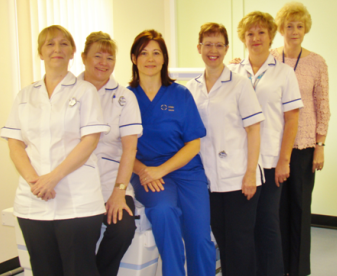Aneurin Bevan University Health Board - Nevill Hall hospital

The Fracture Liaison Service is a collaboration between Radiology and Rheumatology Directorates. The service aims to reduce risk of further fractures in patients presenting with a ‘new incident osteoporosis fragility fracture’, that is women and men over 50 years of age with a low trauma fracture of a site associated with osteoporosis.
The service provides
Identification of patients through active case finding in fracture clinics at ABUHB hospitals and referrals from other key services such as the Trauma and Orthopaedic service, Accident and Emergency Departments and Minor Injury Units
- Assessment of clinical risk factors for osteoporosis and risk of future fractures, assessment of bone density (if appropriate), and assessment of risk of falls
- Health education, advice and literature on their individualised risk factors and interventions to enable them to modify and reduce that risk, including advice on diet, smoking cessation, reducing excessive alcohol intake, and appropriate exercise and activity to improve bone density and reduce risk of falls and injury.
- Referrals to other services, for example Falls Assessment Clinics, medical assessment and investigation for secondary causes of osteoporosis
- Reports to GPs on bone density scan, assessment of risk factors and treatment recommendations.
Accessing the service
The service is available to all patients who present with a new fragility fracture as described above.
Information for patients:
One in three women and one in five men over 50 will suffer a fracture during the rest of their life. We aim to diagnose osteoporosis (thinning of the bones) early and then help you manage it. We want to reduce the numbers of fractures you have by ensuring that you rare diagnosed quickly and have access to treatment.
The fracture liaison service provides one-stop clinics for patients known to be at high risk of osteoporosis. You may be referred if you have recently broke a bone. Clinics are held within the DEXA unit at County hospital, Griffithstown (NP4 5YA) and are run by an osteoporosis nurse specialist.
Before your appointment you will be sent a questionnaire to complete and bring with you and leaflets about DEXA scans.
Upon arrival at the department you will first be seen by a radiographer, who will perform a DEXA scan. Following this you may see the osteoporosis nurse specialist, (depending on the result of the scan) who will explain the scan results to you. She will discuss your questionnaire responses and assess your risk of falling and sustaining further injury. Your current medication will be reviewed and advice given on future treatment. This may include blood tests and additional medication (via GP) and/or lifestyle changes such as diet, exercise, smoking and alcohol. If appropriate you will be referred on to other services for example occupational therapy, physiotherapy.
You may require a further DXA scan at a later date to assess your response to treatment. Your GP will be informed by letter of the results of your DXA scan and any changes to your treatment.
Common reasons for further investigation would be very severe osteoporosis or deterioration despite treatment.
More information on: http://www.wales.nhs.uk/sitesplus/866/page/82577
Brecon Road
Abergavenny
NP77EG
United Kingdom